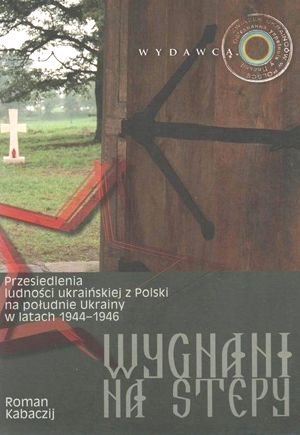Roman KABACHII: “Wars and deportations destroyed the borderland culture”
The historian speaks about the importance of understanding the controversial themes in the Ukrainian-Polish relations
Warsaw publishing house Tyrsa, affiliated with the Union of Ukrainians in Poland, has recently published study Expelled to the Steppes: The Ukrainian Relocation from Poland to Southern Ukraine, 1944-1946 by historian and journalist Roman Kabachii. Its publication in Polish was sponsored by the Ministry of Foreign Affairs of Ukraine, Canadian Institute of Ukrainian Studies, and two Ukrainian Canadian families. The author is currently preparing updated and expanded version of the book for publication in Ukraine which will be more of a popularization as opposed to its strictly academic Polish counterpart.
Mr. Kabachii, what prompted your interest in the subject of the Ukrainian deportation? How much time has your work on it taken?
“Expelled to the Steppes in Polish is a monograph based on my Ph.D. thesis that I wrote in 2001-06, at the Department of Contemporary History of Maria Sklodowska-Curie University in Lublin where I was studying at the European College of Polish and Ukrainian Universities program. My research advisor there was the late Professor Tadeusz Radzik. He advised also two Ph.D. students who wrote highly controversial theses, OUN in Poland, 1929-1939 by Roman Vysotsky and Persecution of Orthodoxy in Chelm Land and Podlasie, 1920-1930 by Hryhorii Kupriianovich (both authors are Polish Ukrainians). My thesis was entitled The Ukrainian Relocation from Poland to Southern Ukraine, 1944-1946.
My interest in the topic arose during my studies at the History Department of Kherson Pedagogical University after I stumbled upon two archive files on living conditions of the relocated in Kherson region who had been honestly and humanely treated by one Manzelo, an inspector for the affairs of the relocated. She literally fought battles for the rights of Polish Ukrainians. My first research paper was based on these documents, and then Professor Jaroslaw Moklak from Krakow suggested that I write a full-scale study. The Lublin university provided me with an opportunity to do it in 2001.”
Have you applied to Ukrainian publishers, and if so, how have they reacted to your offer of cooperation?
“Firstly, Nash Chas publishing house became interested, and it was they who proposed my study for state subsidy in 2010, but the new government preferred to support, among others, Volodymyr Lytvyn [author of volume Kyiv of the 28-volume encyclopedia Catalog of Historical and Cultural Monuments of Ukraine. – Ed.] and Anatolii Tolstoukhov [author of Khartsyzsk: Time, Events, People. – Ed.]. I then offered the manuscript to Tempora publishers, but they refused as they prefer to publish Ukrainian-themed books written abroad by non-Ukrainian researchers. Currently, the book is being published by Svit Uspikhu company, and the funding has been already secured.”
To what extent is it really important to discuss difficult topics in Polish-Ukrainian relations?
“It is important since we were brainwashed for a long time into believing that: a) we had been dominated by Polish nobility, and b) the Sovietized Poland was as close (or as distant) to us as Yugoslavia or Romania were. In fact, we are much closer to the Poles historically, culturally and mentally. A third of Kyivites spoke Polish in the early 20th century. Regarding such controversial historical issues as the Polish-Ukrainian war for Lviv in 1918, the destruction of Orthodox churches in Chelm Land and Podlasie in 1938, Volyn tragedy of 1943, the population exchange of 1944-46 and action Vistula of 1947 (the latter two events are often confused), I think we have to study them quite thoroughly which will enable us to know causes of those sad events as well as consequences to which they have led. They resulted in the borderland culture having been destroyed and Ukraine cut off from its ancient centers in Chelm, Sanok, Przemysl, while Poland has been cut off from Lviv. Through understanding these issues, we can better understand why Poland is a major advocate of Ukraine in Europe now.”






